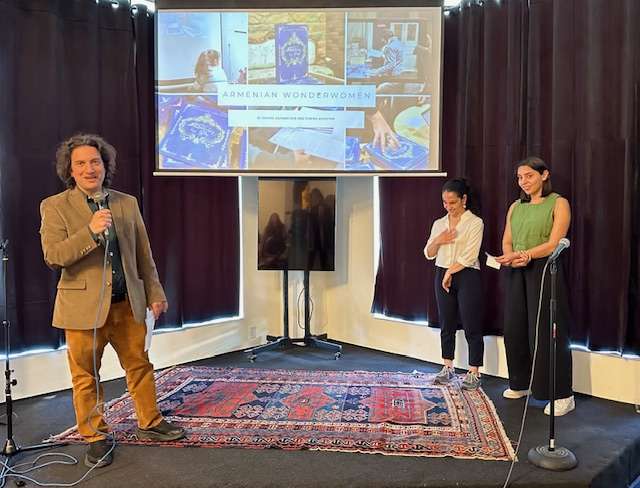Armenian Wonderwomen, published in an Author’s Edition in Yerevan, Armenia, in 2023, gives us a glimpse into the lives of 37 Armenian women, both historical and contemporary, who have defied the stereotype and made a difference with their achievements, yet have almost no representation in Armenian history books except “through marriage to kings or through motherhood.”
With their stories, co-authors Gayane Aghabalyan and Elmira Ayvazyan, both from Yerevan, aim to educate 10-year-old schoolchildren about history’s unfair treatment of women and about the need to bring about positive change in their lives.
The book is published in three versions — English, Eastern Armenian and Western Armenian — a phenomenon unique to an Armenian children’s book.
The budding authors are thrilled about their vision of a future where there are no exclusions. While obviously guided by their love and admiration for the women featured in their book, they are also angry that history has chosen to ignore or to marginalize these exceptional women. Finding out about Diana Agabeg Apcar, the very first woman to hold a diplomatic position, at 21, “refueled my anger and provided inspiration and drive,” noted Aghabalyan.
Both women bemoan the fact that there are only three streets in Yerevan named after women. On a walk in the streets of the Armenian capital, the vigilant pair noticed a children’s book about “Jobs for Men” and “Jobs for Women” displayed in a shop window. “We sometimes inadvertently reinforce the stereotype,” they deplored. There is, nonetheless, no animosity, no belligerence in their pronouncements. Theirs is a peaceful demand to set things right.
The book starts with the pioneering novelist Srpuhi Dussap (Vahanian) who, defying all norms, defended a woman’s right to education and encouraged women to think and act freely. Along with some other familiar names, featured in the slim volume are little known wonderwomen in diverse geographies, in a variety of fields — referees, weightlifters, farmers, animated film producers. We learn about Anita Caracotchian Conti, the first woman oceanographer, one of the first people to start conversations about overfishing in the world. We learn about Louisette Texier, born Arpine Hovanessian, who became a car racer at 40, when women did not even have the right to own a car.


 At left, Arno Yeretzian of Abril Bookstore, with the two authors (photo Karine Armen)
At left, Arno Yeretzian of Abril Bookstore, with the two authors (photo Karine Armen)  Co-Authors Gayane Aghabalyan and Elmira Ayvazyan (Karine Armen photo)
Co-Authors Gayane Aghabalyan and Elmira Ayvazyan (Karine Armen photo)  Armenian Wonderwomen
Armenian Wonderwomen 





